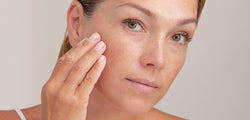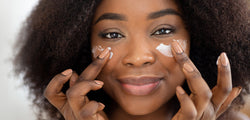
What Does Collagen Do For Your Face?
Table of Contents:
It is easy to see why more and more people are searching for answers to queries such as, "What does collagen do for your face" or "What I can do to delay the appearance of wrinkles for as long as possible?" In fact, these two queries ranked incredibly high last month on major search engines. Collagen is nowadays almost synonymous to youthfulness.
Well, it is understandable. You see, collagen is one of the most abundant proteins we have in our bodies. It is a major building block behind most of the human body's architecture, right from the connective tissues that form the skeletal framework to the skin, muscles, ligaments and tendons. In short, it is what you are made of, literally.
More specifically, collagen plays a critical role in ensuring the optimum health of your skin, lubrication of your joints and strengthening bones. Each of these is a marker of youthfulness and virility which explains why older people tend to have weaker bodies than young adults at the prime of their lives. But as it happens with most other natural body secretions, we tend to produce less collagen as we rack up the years and blow more candles on our birthdays. It is these deteriorating collagen levels with age that often result in fine lines, unsightly wrinkles, stiffer jointer and fragile bones.
As far as the skin goes, ample collagen levels translate to smooth, supple, firm and soft skin. After all, collagen is the essential nutrient needed by the cells of the skin to repair, rejuvenate and renew themselves. It is also believed that face collagen also plays a role in keeping the skin moist while improving its propensity to resist the vagaries and extremities posed by the immediate environment. It is no wonder that most skin care gels and creams that promise that elusive youthful glow often contain collagen as one of the active ingredients.
How To Restore Collagen In The Face?

Just because Father Time and Mother Nature dictate that our collagen levels have to drop off progressively with age does not necessarily mean that there is nothing we can do about it. There are several ways you can restore and boost your diminished collagen levels while concurrently slowing down aging, it's not all doom and gloom. Here's a quick primer on how to restore collagen in the face.
1.Boost your Hyaluronic Acid Levels
Hyaluronic acid is one of the compounds that your body needs to synthesize as much collagen protein as possible. It, therefore, goes without saying that boosting your intake of foods rich in this nutriment could go a long way in improving the levels of this protein. In fact, it is one of the most reliable ways of how to build collagen in a short timeframe.
You may add the all-important hyaluronic acid to your diet by eating foods such as root vegetables, soy, beans and cauliflower.
2. Increase Your Intake of Vitamin C (Ascorbic Acid)

Vitamin C, one of the most significant essential vitamins that the body needs regularly, plays a role in the build up of the body's collagen stores. It's no surprise that you cannot talk about how to increase collagen production in skin without mentioning ascorbic acid. If anything, it is the same logic for its presence in more than 90% of top skin care protective and anti-aging creams in the market.
Fortunately, it is easy to build up your ascorbic acid levels by incorporating lots of green leafy vegetables and fresh fruits into your eating routine. This includes the likes of broccoli, spinach, strawberries, papaya, citrus fruits such as tamarind and oranges.
3. Discover the Magic of Aloe Vera Gel
Aloe vera is among the top topical natural collagen sources you can rely on to ease a rash, fight hyperpigmentation or heal a sunburn. It has been known for its superior medicinal properties for generations now but it is only recently that its role in restoration of collagen stores was unearthed and appreciated.
In other words, you do not have to wait until skin damage sets in for you to discover the magic of aloe vera extracts. Aloe sterols, for instance, which are capsules that can be taken orally have been shown to be useful in delaying the onset of wrinkles and fine lines should you start taking them early enough.
Apart from this, there's anecdotal evidence that suggests that aloe vera is capable of influencing the right skin cells to grow thereby reducing the conspicuousness of tell-tale signs of aging.
4. Up Your Antioxidants Intake
By now, you probably already know how antioxidants shield the body from damage from free radicals. The free radicals, in this case, are known to wreak havoc on the body's collagen stores and its ability to synthesize new building blocks of this important protein. And while antioxidants may not necessarily boost the production of collagen directly, their presence plays a very crucial role in aiding the collagen which is already present to do its job as best as possible.
Speaking of which, foods that are considered to be rich in antioxidants include;
- Yerba mate
- Blueberries
- Green tea
- Mulberry extract
- Coffee extract
- Cinnamon
- Oregano, basil, and natural thyme
- Licorice extract
- Pomegranate extract
- Astragalus
5. Adopt Ginseng

Ginseng has carved out a name for itself in the folk and traditional medicine niche after centuries of being the go-to panacea to a myriad of health complications. And recently, dermatologists discovered that it is also among what stimulates collagen production in the bloodstream. Besides, ginseng packs a number of anti-oxidative and anti-inflammatory properties beneath its reclusive-looking shell. These properties are highly essential in slowing down aging and reducing the visibility of wrinkles and fine lines.
6. Apply Retinol-based Creams
Retinol is another critical antioxidant when it comes to topical collagen-boosting additives to have in your life. It plays a superb role in increasing the effective lifespan of collagen by blocking the action of certain enzymes that can destroy the integrity of your collagen stores. In short, as much as you are building up your collagen levels, you will still need the presence of retinol to maintain those hard-earned gains.
7. Invest in Specific Skin Treatments Such as Red Light Therapy
Several skin treatments such as chemical peels, microdermabrasion, and laser resurfacing are proven to be beneficial in stimulating the production of collagen. However, most of them are somewhat invasive and require plenty of time to recover from.
Red light therapy, on the other hand, is a safe, quick and non-invasive way of increasing the content of collagen in one's skin. Apart from being virtually pain-free and devoid of side effects, users who have tried it reported increased skin elasticity and a notable decrease in the visibility of wrinkles. What's more, you can even perform the treatment yourself at the comfort of your home.
Do Collagen Creams Work?

The onset and popularity of collagen serums in the past several years has elicited a lot of concerns and questions like, "Do collagen creams work?" and "What does collagen cream do?"
Well, let's set the record straight.
Collagen is responsible for the fullness and plumpness that we associate with youthful-looking faces. And now that we know our production of this structural protein drops off with time and exposure to pollutants, you need a way to slow down this loss and somehow replace some of the lost stores for you to look significantly younger than your agemates.
Here's why topical collagen-rich creams such as Maryann's Collagen Cream comes into play. These creams play an immense role in replenishing lost structural proteins while also creating an environment where your skin can maintain what's remaining of its original stores for as long as it is humanly possible. Besides, there is evidence that well-formulated collagen creams, especially the hydrolyzed variants, also boost the general hydration and moisture retention capability of your face.
In other words, if you are still agonizing over questions like, "What is collagen cream?", you only have to remember that these creams often contain broken down chains of collagen known as peptides. These smaller chains of amino acids are often small enough to traverse the outer skin barrier and get assimilated into the underlying dermis layer. Essentially, what collagen creams attempt to do is to speed up the availability of building blocks needed to the fibroblasts that will eventually morph into collagen.
In Closing
Whether you prefer to go the collagen serum and creams route or you are more of a foodie, there is no shortage of ways that you can boost your skin's collagen stores. Either way, it's still advisable to adopt a balanced diet that is rich in protein-rich sources such as dairy, beans, eggs, meat and fish to give your skin a helping hand in your collagen replenishing prospects.













